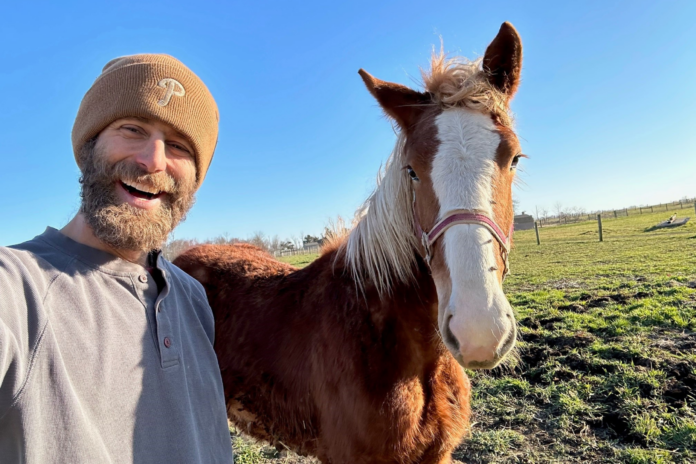Life can be tough for working horses in the U.S., and when they can no longer work they may be sent to slaughter, enduring long journeys in terrible conditions.
One lucky horse escaped this terrible fate and now lives happily at a sanctuary in New Jersey, forming a strong bond with her rescuer.
“Ellie had had barely any human interaction with humans before she arrived at Rancho Relaxo,” said Caitlin Cimini, 39, president and founder of the New Jersey–based sanctuary.
Caitlin Cimini
In a video posted to Instagram, Cimini said that Ellie was on her way to slaughter and Rancho Relaxo was able to intercept her. In the video, Cimini’s partner, Len, can be seen trying to put a halter on the terrified and skinny horse.
“Len was trying to fix her halter, which was broken, and we were worried she would get it caught on something,” said Cimini. “She wanted no part of it. She was fearful, most likely having been abused before coming here to our sanctuary. That’s common when it comes to horses who were bred to work in fields. They are viewed as machines instead of beings.”
Ellie was sent to slaughter when her apparent leg problems became obvious, making her no longer useful to her previous owner.
The man rescuing Ellie in the video is Len, originally a “surfer dude from Orange County,” according to Cimini. “He never saw himself living at a farm sanctuary,” she said. “He dove head first into our mission here at Rancho Relaxo and never looked back. He works 10 to 12 hours a day for the animals, and it’s amazing to see his dedication.”
She continued: “Ellie has improved a great deal through supplements and physical therapy. We intercepted her from that horrible fate. Horses suffer hoarding, slaughter, abandonment, exploitation, then being disposed of after they can no longer provide for their owners.”
Horses stopped being slaughtered for meat for human consumption the U.S. in 2007. However, more than 21,000 are sent to Mexico and Canada every year, with most being killed and sold as meat, according to the website Animal Equality.
After an investigation, Animal Equality said it has filmed proof of American horses being held at slaughterhouses in Zacatecas, Mexico, with horses identified by U.S. Agriculture Department tag numbers.
The investigation found documents explaining how these horses ended up in Mexico.
“Horses from this particular auction are transported across Texas for nearly eight hours,” Animal Equality said. “They then cross the border into Mexico in Eagle Pass and travel for more than 9 hours until they arrive at the Cárnicas de Jerez slaughterhouse in Zacatecas—a total of 17 hours of travel.”
The Humane Society of the United States, says on its website, “Slaughter is a brutal and terrifying end for horses, and it is not humane. Horses are shipped for more than 24 hours at a time without food, water or rest in crowded trucks. They are often seriously injured or killed in transit.”
The Human Society says horses are skittish by nature because of their heightened fight-or-flight response, “which makes accurate pre-slaughter stunning difficult.”
“As a result, horses often endure repeated blows and sometimes remain conscious during dismemberment—this is rarely a quick, painless death,” the Humane Society said. “Before the last domestic plant closed in 2007, the USDA documented in the slaughter pipeline rampant cruelty violations and severe injuries to horses, including broken bones protruding from their bodies, eyeballs hanging by a thread of skin, and gaping wounds.”
Fortunately, this was not to be Ellie’s fate.
“All of the animals at Rancho Relaxo will only know peace and love. Their lives are their own, and we fully understand that here,” said Cimini.
One user on Instagram wrote: “Such a beautiful ending. Terribly sad that Ellie’s life was so cruel that she was frightened of the outcome from a human.”
Another said: “The difference in her looks at the end of the video. You guys are the best!”
Uncommon Knowledge
Newsweek is committed to challenging conventional wisdom and finding connections in the search for common ground.
Newsweek is committed to challenging conventional wisdom and finding connections in the search for common ground.


